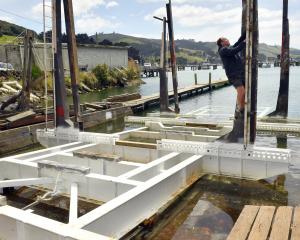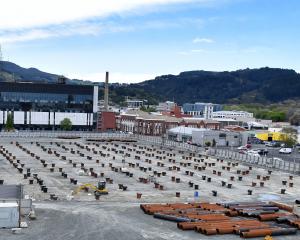
Good luck Wānaka, it can be resisted
The good people of Wānaka may take heart from the experience of our one-time vacation preference, Port Douglas in tropical North Queensland.
On our final visit, before retirement, (our seventh and last, prior to our relegation to the "unwaged" caste), McDonald’s was waging a full-out assault on our favourite winter get-away, which despite the presence of more than 60 eateries in the town and its vicinity, took the arrogant view that life in Port Douglas could, by some bizarre line of reckoning, only be "complete’' once it, too, had its McDonald’s.
The sticking point for the Shire council had been the arrogant expectation that the ostentatious yellow "Big-M" be internally illuminated night and day. The council remained adamant that if McDonald’s insisted on pursuing that line, it was not wanted in the town.
The saga was ongoing at the time of our visit, but I understand that in the end McDonald's had given up, and as far as I know, Port Douglas never received its "benefits’'.
So, coercion and blitzkrieg tactics to the contrary, it is possible for a resort to be complete without its McDonald's, and I hope it still remains that way today, for its many, and in our experience, well-satisfied, visitors.
So good luck Wānaka.
Naive approach
To say that I am upset by the arrogance and naivete of Mr Luxon and Mr Seymour would be an understatement.
I am appalled by their complete lack of experience in cross-cultural matters and their lack of understanding as to what is being said, and what is more, their not really listening.
I spent some years working in Papua New Guinea and the Solomon Islands doing medical work. What I learnt very quickly was that I knew nothing.
It was not until I started to learn the language, spent time listening, and saying very little that I began to understand.
Experience by immersion in other cultures should be compulsory for any serious politician, and this means utter respect for the Tiriti.
Otherwise, the waka will run aground or into a storm that none of us want.
Useless bins
The majority of farms /lifestyle blocks and homes in the country have ways of using their recycled materials in other ways and don’t require more bins.
We have survived using approved black bags for rubbish and blue bins for glass. Our yellow top bin has been repurposed. Our paper etc is buried in garden/landfill.
We will also need to find a way to get the large recycle and rubbish wheelie bins 1km down a gravel road to our pickup point. $300 to have bins we have to think of a use for, or perhaps we drop them back to the council?
From the editor
Thank you Julian Doorey for your letter (ODT 8.12.23). We welcome correspondents’ opinions. We stand by our report (ODT, 4.12.23) as a fair and accurate portrayal of the "Stage 1: Risk Identification Report" presented by the South Dunedin Future team. The online headline on this story was changed for the reason you identified. The issue identified in the report was potential "permanent groundwater inundation" in parts of the suburb in the near future.
We take climate change — and how it is affecting people in South Dunedin — seriously and we work hard to keep people informed in a clear and simple manner about what local authorities are doing to respond to this issue. — Editor.
Stand up for valued, important aspects of life
What a weird world we live in.
We had a Labour-led government which covertly introduced a number of preferences for those with Māori blood and whilst there were concerns expressed about the race-based aspects of such laws, they were accepted and implemented with minimal opposition.
Yet when the current government stated these would be reversed and in future all people would be treated equally in law, almost immediately the new government is accused of being racist. Some have even suggested that they will be promoting an uprising — which in some countries could be regarded as sedition.
Kiwis have always been proud of the lack of class structure, that we are all one country irrespective of race and origins, proud of Māori heritage and culture. Perhaps it’s time for the silent majority to not be so silent if these valued and important aspects of life in New Zealand are to be undermined by a few for personal reasons.
Legal definition
The article "Anti-Māori" policy protests" (ODT 5.12.23), in response to Act New Zealand’s bid to redefine Treaty principles is based on an incorrect point. How do you redefine principles that have never been defined in law in the first place? Every National or Labour government in the past has chosen not to provide legal clarification which has led to the Waitangi Tribunal and judges having to interpret this important aspect. The Tribunal can recommend, judges can implement, but it is our government’s job to make and clarify law. That is why we need to have this discussion. Māori leaders seem to prefer loose wording to actually formally contributing to a parliamentary discussion on these yet to be legally defined principles.
Smoking issue rekindles navy service stories
The flavour of the week from central government politicians is smoking. Matters concerning this addiction have changed considerably over the last 60 years.
In 1960, when in the Royal NZ Navy it seemed to me as if the navy were promoting tobacco products by these being duty-free. Some just 16-year-old Seaman Boys smoked but we were not allowed alcohol. One could purchase a carton from many different brands a month for 10 shillings.
Many junior rates in the navy smoked but when one was only being paid in the hand 15 shillings a fortnight this was not enough money to enticed me to smoke. However, I very soon realised I would make 100% profit by getting my monthly ration and selling it to civilian contacts in the naval dockyard.
The navy did take a very dim view if sailors were caught selling tobacco products outside base: it was called smuggling. If someone was caught doing this it generally resulted in at least 30 days’ detention at the then Ardmore military services correction establishment in South Auckland.
When training in Scotland it was a little different in the Royal Navy. Cigarettes were still duty-free but branded with a very noticeable blue stripe lengthways, apparently done in a effort to prevent "trading" with civilians, or civilians stealing them.
Much later when serving at the Papakura Army Camp I still did not smoke. Senior army personnel every now and then ordered junior ranks to take part in what was called an "Emu Parade". This involved a line of at times up to 20 or more soldiers picking up cigarette butts off the ground. It is still unprintable of what the non-smokers at the time called these fellow smokers.
About three years ago, and now much older, I had the chance to go back inside the Devonport base. When I asked about the availability of tobacco products I was quickly informed that these products in any form were not promoted within the navy.
What had not changed was the excellent meals still being prepared by the navy cooks.
Address Letters to the Editor to: Otago Daily Times, PO Box 517, 52-56 Lower Stuart St, Dunedin. Email: editor@odt.co.nz












